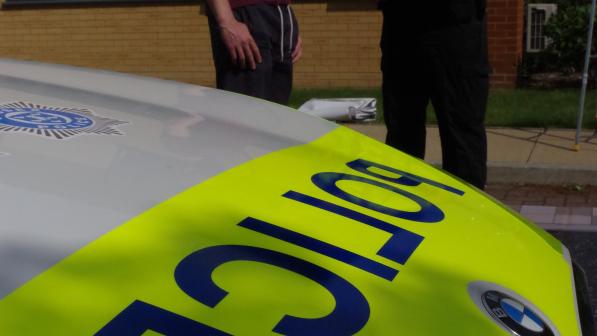Close driving ban 'loophole', demands Cycling UK

- Increasing numbers of drivers are avoiding disqualification by claiming that the loss of their licence would result in exceptional hardship
- More than 11,000 drivers with 12 or more points on their licence are still allowed on the roads
- Cycling UK calls on Sentencing Council to strengthen guidelines
- Darrell Martin, whose brother Lee was killed while cycling by a driver who had kept his licence despite eight previous convictions, supports tougher approach
Cycling UK is calling on magistrates to make it harder for motorists to escape driving bans by claiming that the loss of their licence would lead to “exceptional hardship”. The national cycling charity has been campaigning to highlight this issue since the death in 2015 of Lee Martin, a cyclist killed by a driver who had used the plea of exceptional hardship to keep his licence despite eight previous convictions.
In a submission to the Sentencing Council this week (April 15), Cycling UK wrote that it is “concerned that the exceptional hardship plea has become a ‘loophole’, which increasing numbers of offenders each year have exploited.” Among the points it raised were:
- Pressures on court time are such that offenders’ pleas are routinely accepted without adequate supporting evidence, and without robust challenge.
- The requirement for potential hardship to be “exceptional”, and the test for this, is not made clear.
- The guidance to courts focuses on the consequences of the loss of a licence, as though the licence to drive is an entitlement, rather than a privilege.
“Assertions of exceptional hardship should be robustly questioned by courts, not accepted without challenge,” said Duncan Dollimore, Cycling UK’s Head of Campaigns. “This should include full consideration of alternative travel options, including active travel (cycling and walking), public transport, taxis, assistance from family or employees, or in the case of wealthy offenders, the use of a private chauffeur.”
Lee Martin, a 48-year-old father of two, died in August 2015 while taking part in a cycling event, when he was hit by a van driven by Christopher Gard, who was distracted by texting. Gard had eight previous convictions yet was allowed to keep his licence after pleading exceptional hardship in court just weeks before the fatal crash.
Lee’s brother, Darrell Martin, backed Cycling UK’s calls for courts to be tougher on exceptional hardship cases. “The man who killed my brother attended a magistrate’s court six weeks before killing him,” he said. “He already had seven convictions for using his phone at the wheel. He was there for his eighth and was contesting losing his licence. He argued that not being able to drive would make it hard for him to carry out his job, and also to see his son. He claimed ‘hardship’ would result. He also made promises to the magistrates that he would lock his phone away whilst driving.
“The outcome of their decision led to this man leaving court still able to drive. He then went on to kill my brother while texting a friend about taking his dog for a walk. he smashed into Lee at 60mph while Lee was cycling along the road.
The ‘hardship’ caused to his daughters, his wife, his mum and dad, his brothers, his friends, which ripples outwards to so many other people, far outweighs the hardship of a serial offender being unable to drive to work.
Darrell Martin
“In some ways Lee was fortunate: we were told he would have known nothing of the event. But the ‘hardship’ caused to his daughters, his wife, his mum and dad, his brothers, his friends, which ripples outwards to so many other people, far outweighs the hardship of a serial offender being unable to drive to work or to see his child.”
“Having a licence is not a right, it is a privilege, and if people continually display total ignorance of the potential danger of the weapon they are driving then this privilege should be taken away. Courts need to stop listening to lame excuses when it is clear that some people do not learn."
Duncan Dollimore commented: “The death of Lee Martin shows how serious the consequences of this loophole in the law can be. Driving disqualification is not merely a punishment for offending, but also a road safety measure.
“Most people who are disqualified from driving will suffer some form of hardship, in the sense that it will impact on their usual routine. That is one of the intended consequences of the punishment. For that hardship to be exceptional, however, it must be rare and extraordinary enough to justify someone keeping their licence.”
Contact information
Due to the restrictions caused by the coronavirus outbreak, currently the normal press office number 01483 238 315 is not being monitored. For further information during working hours please contact Sam Jones, communications and media manager, on 07584 271300 or Rob Kingston, communications officer, on 07880 424 912. Outside working hours call 07786 320 713 or email [email protected]
Notes to Editors
- Cycling UK, the national cycling charity, inspires and helps people to cycle and keep cycling, whatever kind of cycling they do or would like to do. Over a century’s experience tells us that cycling is more than useful transport; it makes you feel good, gives you a sense of freedom and creates a better environment for everyone. www.cyclinguk.org
- Research by the road safety charity IAM RoadSmart found as of 9 April 2019, the number of people with 12 penalty points or more on their licence who still had an entitlement to drive was 11,105. See https://www.iamroadsmart.com/media-and-policy/newsroom/news-details/2019/04/29/iam-roadsmart-frustrated-that-more-than-11-000-drivers-hold-licences-legally-despite-having-12-penalty-points-or-more
- Christopher Gard was jailed for nine years in September 2016 for causing death by dangerous driving, and banned from driving for 14½ years: https://www.bbc.co.uk/news/uk-england-hampshire-38648736
- Cycling UK’s full response is available here. The consultation document is at https://www.sentencingcouncil.org.uk/wp-content/uploads/MCSG-consultation-FINAL.pdf
- Cycling UK suggested a number of ways in which the guidance given to courts in such cases should be changed:
- It should be down to the offender to prove that exceptional hardship would be caused by disqualification. In the absence of independent evidence to substantiate this, the court should ask whether such evidence could and should have been provided, and draw any inference from its absence.
- Assertions of exceptional hardship should be robustly questioned by courts, not accepted without challenge. This should include full consideration of alternative travel options, including active travel (cycling and walking), public transport, taxis, assistance from family or employees, or in the case of wealthy offenders, the use of a private chauffeur.
- Courts should bear in mind that driving is not an entitlement or right, but something people are licensed to do; the loss of a licence through disqualification is not merely a punishment for offending, but also a road safety measure which focuses attention on the consequences of irresponsible driving.
- Courts should accept that most people who are disqualified from driving will suffer some form of hardship, in the sense that it will impact on their usual routine. That is one of the intended consequences of the punishment. For that hardship to be exceptional, however, it must be rare and extraordinary enough to justify a decision not to impose the minimum disqualification provided by law.

